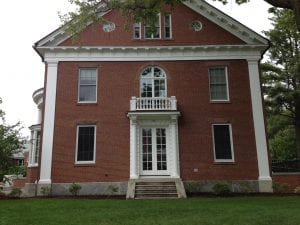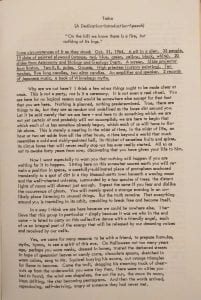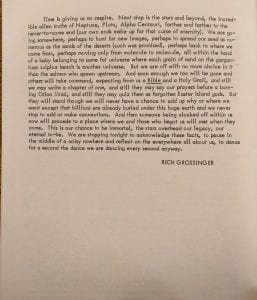—- Io —-
Name: vowel-only, short and modest… a line and a circle in disguise.
Type: Experimental magazine, a “little magazine”
Sadly mistaken on subscription checks as: Lo, Ten, IQ, Id, I.O, or [blank] Magazine.
Pronunciation: “eye-o” (astronomical: Jupiter’s satellite moon) rather than “ee-o” (Greek mythology: Zeus turned Io, one of his mortal lovers, into a white heifer to hide their relationship from his ever-jealous wife, Juno)
“As a small moon of Jupiter, Io is a tiny unknown, governed by the massive laws of a larger unknown”
Note in Io-2
—- —- —- —-
Setting: a Halloween ceremony in the fall of 1964. Glen behind Phi Psi (now Drew House).

Richard Grossinger ‘66 gave a speech to celebrate occult and Jungian readings, a speech that would not only appear as the first piece in Io-1 under the name “Tarka” (see below), but also attracted the attention of Robert Kelly, an American poet who would become Io’s primary intellectual and artistic guide. Grossinger and Lindy Hough, his girl-friend from Smith College, would travel to New York on trips for further studies with Robert Kelly.
Confluence of events leading to Io‘s creation and direction:
- Idea of an independent publication: conceived by Ed McBride ‘65 and then passed on to Marty Bickman ‘67, Richard Grossinger ‘66, and Dave Greenlie ‘67
- Fraternity council demanding that Phi Psi use tuition money to create its own publication (along with forming a band)
- Grossinger and Hough making trips to New York to study avant-garde literature with Robert Kelly
Io was intended to be a one-shot deal. With a fund of fifty dollars, it began as a fraternity magazine, a “rushing publication.” Among other factors, careful management by treasurer Randall (Randy) Gingiss ‘66 enabled Io to live past one issue. Io-1 was sold for a quarter each, while the price for Io-2 increased to a dollar. Phi Psi members would pick up copies abandoned on chairs to resell, and the long dinner lines at Valentine Dining Hall proved their use for the first time as several hundred copies were sold there. Members would ask for ads from their parents and merchants in Amherst, Northampton, and Belchertown.
When Io looked beyond its fraternity ties to become a four-college magazine, funding increased, coming not only from the colleges but also from advertisers and sponsors in the Pioneer Valley and New York. Joining Grossinger as editors were Lindy Hough (Smith College), Susan Mohl (Mt. Holyoke College), and Prof. Robert Bagge (UMass Amherst). But this four-way collaboration fell apart quickly, leaving the new editorship for the first two issues to be Grossinger, Hough, and Nelson Richardson ‘67, a student poet at Amherst.
The increasing literary notoriety from Io, combined with the outspoken Grossinger, made him a bête noire, with that label’s unexpected benefit of attracting some administration attention. Grossinger visited Calvin Plimpton, the Amherst College president from 1960-1971, and managed to receive funds for Io as well as film and poetry series held at Phi Psi. As a result, Phi Psi hosted visits from poets such as Robert Kelly, Paul Blackburn, and Diane Wakoski, in addition to showing films by Stan Brakhage and Bruce Conner. Readings and lectures by these poets and film-makers generated “radical artistic innovations for the locale,” attracting many from the Pioneer Valley to the Phi Psi salon and Coffee Hour.
Literary Magazines ← BACK NEXT → Inside Io
Overview of Literary Magazines
Of Moons and Serendipity: the conception
Inside Io: mission statement, Io-1
Eyes on Io: the reception
Io after Amherst: post-Amherst transformation
Bibliography
Project by Phuong-Nghi Pham ’18

